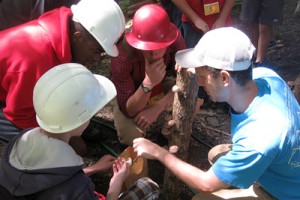By Karene Booker
Reprinted from the Cornell Chronicle, October 24, 2011

To strengthen its ties to research, oversight of 4-H -- New York state's largest youth development program -- has moved to Cornell's new Bronfenbrenner Center for Translational Research from Cornell Cooperative Extension. The move will provide new opportunities for teaching and research and help to improve 4-H programs.
"Research is critical to the mission of preparing youth for adulthood," said Stephen Hamilton, professor of human development and associate director for youth development at the Bronfenbrenner Center. "In the translational research model, science informs program content, how it is delivered and how results are evaluated. In turn, practice informs research by identifying new questions that research could address.
"By bringing 4-H even closer to the university, our aim is to ensure that programming decisions are based on the best evidence of what young people need and what programs are most likely to meet those needs. Some of the evidence will be found in the research literature. Some will be generated by research conducted by Cornell faculty and staff working collaboratively with 4-H educators, volunteers, youth and other stakeholders."
4-H is rooted in science. The program originated at the land-grant universities at the turn of the 20th century to introduce such improved practices as hybrid seed corn, milk sanitation and safer home canning procedures. Researchers found young people were more open than adults to the new ideas and technologies and would share their successes with their parents and communities. These innovative programs for rural youth gave rise to the first 4-H clubs. Soon 4-H became a national youth development program run by the land-grant universities and the Cooperative Extension system.
In New York state in 2009-10, almost 17,000 volunteers and 113,000 youth from urban, suburban and rural communities participated in 4-H. State staff in the Bronfenbrenner Center guide programs and provide support for 4-H educators in each county's Cornell Cooperative Extension office. 4-H provides hands-on learning and mentoring through community clubs, camp settings, after-school and school-based projects that emphasize science, engineering and technology, citizenship and healthy lifestyles. Learning by doing is a fundamental 4-H ideal intended to encourage young people to experiment, innovate and think independently, and to help them develop leadership, citizenship and life skills.
"Our goal is to link the extensive array of county-level programs with the latest research on youth development," said Valerie Adams, New York 4-H youth development program leader. "In an era where such programs compete intensely for funding and for time -- both on the part of kids who participate and the adult volunteers and staff who run them -- we need to be able to show that these projects make a difference. With 4-H as a part of the Bronfenbrenner Center, we have a wonderful opportunity to provide the type of support our county educators need to do just that."
The Bronfenbrenner Center, based in the College of Human Ecology, formed in July 2011 when the Family Life Development Center and the Bronfenbrenner Life Course Center merged.
Karene Booker is an extension support specialist in the Department of Human Development.
Related Links:
Bronfenbrenner Center for Translational Research
College of Human Ecology
New York State 4-H

